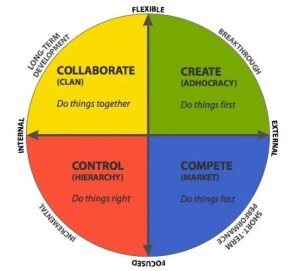Corporate culture is an important determinant of companies’ behavior and success and, as a result, has drawn much attention, particularly from the business press. While some companies have received praise for their corporate cultures, others such as Wells Fargo, Valeant Pharmaceuticals, Toshiba, and Hertz have been severely criticized for maintaining cultures that have led to some of the most egregious misconduct in recent years, despite each of these companies having formal ethics and compliance guidelines (Zach 2015). But while the broad impact of corporate culture is clear – it affects everything from ethics decisions (Audi et al. 2016) and economic performance (Guiso et al. 2015) to management control systems (Widener 2004) and accounting practices (Ji et al. 2017) – it lacks a widely accepted definition or a useful way to measure it, making attempts to study it challenging.
In a recent study, we rely on the well-known Competing Values Framework (CVF, hereafter) theory to define four dimensions of corporate culture and study their implications for financial reporting quality. The CVF defines four types of culture – collaboration, control, competition, and creation, which co-exist in every firm and are positioned in four quadrants across two axes: flexibility versus stability, and internal versus external orientation (Cameron et al. 2014).
Source: Cameron et al. 2014
According to Cameron et al. (2014), collaboration-oriented culture is internally focused and encourages flexibility, while employees working within it have higher trust in leadership because its human resources policies are based on retaining and developing employees. Control-oriented culture is internally focused and fosters stability. The typical activities in this culture involve risk management, improving manufacturing processes and cutting costs. Both control and collaboration cultures are internally focused, but one emphasizes human capital and the other internal process efficiency.
Competition culture emphasizes the aggressive pursuit of higher customer satisfaction and shareholder value. Goals such as dominating competitors, expanding market share, and increasing profitability quickly are some of the drivers of this culture type. Creation-oriented culture fosters an environment of entrepreneurship, innovation, and creativity. Like competition cultures, creation cultures are externally focused on customers, competitors, and markets, but the difference is that competition stresses the short term, while creation strives to envision and change the future.
Consistent with the idea that collaborative environments do not necessarily improve firm financial performance and may reduce the effectiveness of formal control systems (Denison 1990; Jollineau et al. 2012), we find a strong positive association between collaboration-oriented corporate culture and lower financial reporting quality. Further, firms with collaboration-oriented culture are more likely to report a material internal control weakness or significant deficiency. By contrast, competition corporate culture is related to higher financial reporting quality, which suggests that competition dissuades managers from engaging in aggressive financial reporting. Analyses also suggest that firms with competition-oriented culture are less likely to report an internal control weakness or restate financial statements. Therefore, it appears that competition serves as a disciplining mechanism for managers. Evidence on control and creation-oriented cultures is not as consistent across analyses and we refrain from making strong inferences about them.
These findings are reminders that corporate culture affects not only insiders (e.g. the employees and managers) but also other stakeholders, including investors and regulators. In a speech at Stanford University in 2014, then-SEC Chair Mary Jo White stated that “deficient corporate cultures are often the cause of the most egregious securities law violations.” Clearly, regulatory agencies are interested in the effects of corporate culture on firm behavior, and our study speaks to this issue. In addition, our results may be useful in improving the tools used by firms, such as the consulting company Organizational Culture Assessment Instrument, which strives to identify firm culture for its clients and recommend changes based on corporate goals. Furthermore, by understanding the breadth of the impact of corporate culture, leaders become more aware of the implications of the culture of their firm.
REFERENCES
Audi, R., T. Loughran, and B. McDonald. 2016. Trust, but verify: MD&A language and the role of trust in corporate culture. Journal of Business Ethics 139 (3): 551–561. https://doi.org/10.1007/s10551-015-2659-4
Cameron, K. S., Quinn, R. E., DeGraff, J., and Thakor, A. V. 2014. Competing Values Leadership. Northampton, MA: Edward Elgar Publishing.
Guiso, L., P. Sapienza, and L. Zingales. 2015. The value of corporate culture. Journal of Financial Economics 117 (1): 60–76. https://doi. org/10.1016/j.jfineco.2014.05.010
Ji, Y., O. Rozenbaum, and K. T. Welch. 2017. Corporate culture and financial reporting risk: Looking through the glass door. Working paper, The Hong Kong Polytechnic University and The George Washington University
Jollineau, S. J., T. W. Vance, and A. Webb. 2012. Subordinates as the first line of defense against biased financial reporting. Journal of Management Accounting Research 24 (1): 1–24. https://doi.org/10.2308/jmar-50160
Securities and Exchange Commisssion. Mary Jo White’s speech can be found at https://www.sec.gov/news/speech/2014-spch062314mjw
Widener, S. K. 2004. An empirical investigation of the relation between the use of strategic human capital and the design of the management control system. Accounting, Organizations and Society 29 (3–4): 377–399. https://doi.org/10.1016/S0361-3682(03) 00046-1
Zack, G. 2015. The link between corporate culture and fraud. Fraud Magazine. Available at: https://www.fraud-magazine.com/article.aspx?id=4294990480&Site=ACFEWEB
This post comes to us from professors Avishek Bhandari at the University of Wisconsin – Whitewater, Babak Mammadov at Clemson University, Maya Thevenot at Florida Atlantic University, and Hamid Vakilzadeh at the University of Wisconsin – Whitewater. It is based on their recent paper, “Corporate Culture and Financial Reporting Quality,” available here.
 Sky Blog
Sky Blog




